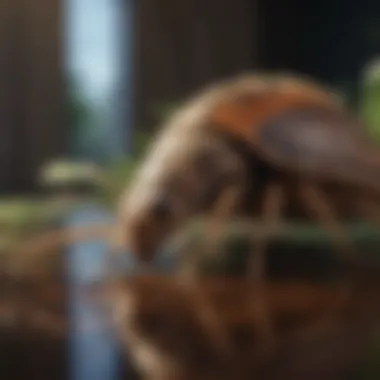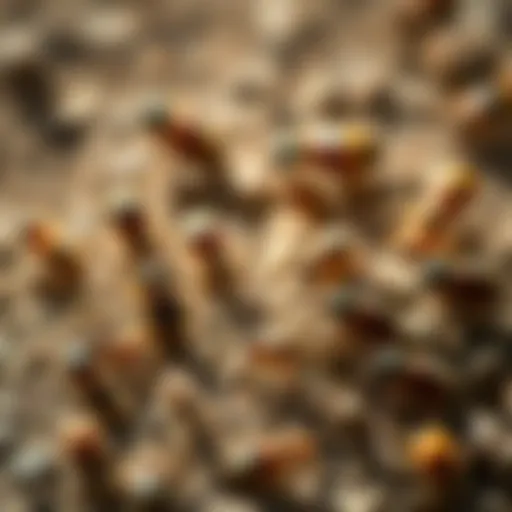Aptive Environmental Strategies in Maryland


Intro
Understanding pest control is essential for maintaining a healthy home environment. Aptive Environmental Services in Maryland has developed innovative strategies to tackle pest management while prioritizing eco-friendliness. This article examines their approaches, focusing on how these methods can empower homeowners. With the pest control industry continually evolving, recognizing key practices becomes increasingly relevant.
Pest Identification
Identifying household pests is the first step in effective management. Knowledge about the most common pests can help homeowners be more proactive.
Common Household Pests
Some of the frequent intruders include:
- Ants
- Cockroaches
- Termites
- Spiders
- Bed bugs
- Rodents
Each of these pests brings its challenges, making accurate identification crucial for targeted intervention.
Signs of Infestation
Recognizing the signs of an infestation early can prevent more significant issues. Look for:
- Droppings near food areas
- Chewed materials like wires or wood
- Nesting materials, such as shredded paper
- Actual sightings of the pests
Homeowners should be alert to these indicators to initiate pest control actions promptly, minimizing damage.
Prevention Methods
Implementing strategic prevention methods can greatly reduce the likelihood of pest invasions. Aptive Maryland emphasizes environmentally friendly methods.
Environmental Modifications
Adapting the environment can deter pests effectively. Consider the following modifications:
- Sealing cracks and crevices
- Reducing moisture in basements and crawl spaces
- Properly storing food in airtight containers
- Ensuring clean drainage areas and gutters
These practices help create conditions that are less inviting to pests.
Home Maintenance Tips
Regular home maintenance is vital. It includes:
- Routine inspections of the foundation and roof
- Cleaning gutters and downspouts
- Keeping landscaping trimmed and away from the house
- Using screens on windows and doors to reduce access
By staying vigilant, homeowners can significantly mitigate pest risks.
DIY Pest Control Solutions
For those inclined to manage pests without professional assistance, understanding DIY solutions is necessary.
Natural Remedies
Several natural remedies can tackle minor infestations. Some effective options are:
- Vinegar and water spray for ants
- Soap and water for aphids
- Diatomaceous earth for crawling insects
These solutions are not only effective but also eco-friendly.
DIY Traps and Barriers
Creating traps and barriers can prevent pests from entering the home. Consider:
- Using sticky traps for rodents or insects
- Building barriers with caulk to seal entry points
- Utilizing essential oils like peppermint as a deterrent
With commitment and the right techniques, homeowners can gain control over pest populations.


Homeowners should prioritize ongoing education in pest management to ensure long-term success.
In summary, understanding how Aptive Maryland approaches pest control allows homeowners to adopt proactive measures. By focusing on pest identification, prevention, and practical DIY approaches, it is possible to create a pest-free environment.
Intro to Aptive Maryland
Aptive Environmental Services is gaining recognition in Maryland as a leader in pest management. Understanding its role is crucial, particularly for homeowners seeking effective solutions to common pest issues. This section aims to clarify what Aptive Maryland embodies and why it matters in today's pest control landscape.
Aptive’s commitment to sustainable practices distinguishes it within the industry. The company not only focuses on removing pests but also emphasizes ecological balance and holistic strategies. Homeowners benefit from these methods, as they mitigate risks associated with traditional pest control while ensuring safe environments for families and pets.
Moreover, with the increase in pest-related challenges due to climate change and urban development, Aptive's innovative approaches are timely. Pests adapt quickly; thus, the importance of understanding how aptive conducts pest control is paramount.
Several key elements set Aptive apart:
- Integrated Pest Management (IPM): This strategy focuses on long-term prevention and minimizing harm to the environment.
- Customer-Centric Services: Aptive tailors its offerings to meet the unique needs of each household, enhancing satisfaction and efficacy.
- Education and Awareness: The company engages with homeowners to highlight preventive measures, nurturing a well-informed customer base.
"Sustainable pest control is not just an option; it's a necessity for preserving our environment and ensuring a healthier life for everyone."
By choosing Aptive, homeowners can expect more than just immediate relief from pests. They receive options that consider their long-term health and ecological impact. This acknowledgment of the intertwining nature of pest control and environmental stewardship can significantly elevate the quality of living in Maryland.
Overview of Pest Control Needs in Maryland
The necessity of pest control in Maryland stems from both ecological and residential considerations. With its varied landscapes and climate, Maryland faces a unique set of pest challenges, making effective management essential for residents. The state not only deals with common pests like bed bugs and termites but also encounters seasonal fluctuations that influence pest populations. Understanding these dynamics is crucial for homeowners who wish to maintain a comfortable living environment.
Common Pests in Maryland
In Maryland, the pest landscape is diverse. Some of the most frequently encountered pests include:
- Ants: Various species, including odorous house ants and carpenter ants, are prevalent.
- Termites: Subterranean termites pose a significant threat to wooden structures.
- Rodents: Both mice and rats can infiltrate homes, seeking food and shelter.
- Bed Bugs: Increasingly reported in urban areas, bed bugs can be particularly troublesome.
Confronting these pests requires specific strategies tailored to their behaviors and habitats. For instance, carpenter ants are often found in damp wood, necessitating moisture control within structures.
Seasonal Pest Activity
Pest activity in Maryland significantly shifts with the changing seasons. Each season brings its own set of challenges:
- Spring: As temperatures rise, pests like ants and termites become active. This is the ideal time for homeowners to conduct inspections for signs of infestation.
- Summer: High temperatures can lead to increased rodent activity and the proliferation of mosquitoes. Regular treatment and yard maintenance are critical during this time.
- Fall: Rodents may attempt to enter homes for warmth. Closing potential entry points should be a priority.
- Winter: While many pests become dormant, the threat from wildlife, especially rodents, persists in looking for shelter.
Understanding Aptive's Services
Understanding the services offered by Aptive Environmental is crucial for homeowners in Maryland. Managing pests effectively safeguards homes and promotes overall public health. Each service is designed to address specific pest challenges while considering the broader environmental impact. This approach not only helps in immediate pest control but also ensures lasting solutions that are safe and sustainable for families and the environment.
Pest Identification Techniques
Effective pest control begins with accurate pest identification. Aptive employs several techniques to determine the type and extent of infestation. This includes visual inspections and behavioral assessments.
- Visual Inspections: Technicians conduct thorough checks on potential entry points, nesting sites, and other areas where pests commonly lurk.
- Behavioral Assessments: Understanding pest behavior is key. This involves observing signs of pest activity, such as droppings or damage to property.
- Customer Education: Homeowners are educated on how to recognize signs of infestation. This knowledge empowers them to take proactive steps.
Aptive's commitment to proper identification means that solutions are tailored to the specific needs of each situation, improving overall efficacy.
Integrated Pest Management (IPM) Approach
The Integrated Pest Management (IPM) approach is a holistic strategy at Aptive that emphasizes prevention, monitoring, and control. This method combines various pest control techniques to minimize risks associated with pesticide use.
- Prevention: Aptive advocates for methods that reduce pest attraction, such as sealing cracks, removing food sources, and maintaining clean environments.
- Monitoring: Regular inspections help track pest populations and identify potential issues before they become serious.
- Control: When intervention is needed, Aptive prioritizes less toxic options. This ensures minimal impact on beneficial insects and surrounding ecosystems.
This approach leads to sustainable results and enhances the quality of life for residents.
Eco-Friendly Pest Solutions
Aptive's commitment to eco-friendly pest solutions sets it apart. Homeowners often worry about the effects of chemical treatments on their families and pets. Aptive addresses these concerns by utilizing products and methods that comply with environmental standards.
- Botanical-Based Products: These are formulated from plant extracts and are less harmful while effectively controlling pests.
- Natural Deterrents: Solutions that use natural scents or other elements repel pests without harmful chemicals.
- Targeted Applications: Rather than wide-area spraying, Aptive focuses on specific areas of need, reducing overall chemical usage.
By choosing eco-friendly options, Aptive not only safeguards homes but also contributes to the well-being of the local ecology. This approach resonates with homeowners who value sustainability.


"Sustainable pest management is not just a buzzword; it is a responsibility we hold towards our community and environment."
Customer Experience and Satisfaction
Customer experience and satisfaction are crucial elements in the pest control industry, particularly for a service provider like Aptive Environmental Services. In an industry that directly impacts the comfort and safety of homes, understanding the customer's journey becomes essential. Satisfied customers are more likely to become repeat clients and refer others. This loyalty is built through attentiveness to their needs and clear communication throughout the service process.
Service Customization
Service customization refers to the ability of a pest control provider to tailor their offerings to meet specific customer needs. Aptive Maryland stands out in this regard by assessing each household's unique situation. They take into account factors like the type of pest problem, the severity of the infestation, and the individual preferences of homeowners. This bespoke approach enhances the overall experience, allowing clients to feel understood and valued.
Customized service not only addresses immediate issues but also lays the groundwork for long-term pest prevention strategies. Customers appreciate solutions that are specifically designed for their environments, as it often leads to more effective outcomes. Knowing that a service is not one-size-fits-all fosters a sense of partnership between Aptive and its clients.
Response Time and Reliability
In the realm of pest control, response time and reliability are vital indicators of service quality. Homeowners seeking immediate assistance from Aptive Maryland expect quick actions, especially when facing an urgent pest issue. The promptness in addressing inquiries and dispatching pest management teams can be the difference between a minor inconvenience and a significant infestation.
Reliability goes hand-in-hand with response time. Customers need assurance that the service they book will be executed as promised. Aptive prides itself on its dependable scheduling and follow-through. This consistency instills confidence among homeowners, allowing them to trust that every appointment will be honored and that qualified professionals will manage pest control effectively.
"The true test of any service lies in its ability to respond swiftly and reliably to customer needs."
Maintaining high levels of customer satisfaction in this sector involves continual monitoring and improvement of these areas. As Aptive Maryland strives to enhance its services, regular feedback from clients plays a crucial role in defining best practices. By employing a systematic approach to customer experience, Aptive not only addresses current customer needs but also anticipates future trends in pest management.
Technological Innovations in Pest Control
In an era where technology influences every aspect of daily life, pest control is no exception. The advent of technological innovations has transformed how services like Aptive Maryland operate, leading to improved effectiveness and efficiency in managing pest issues. These advancements not only streamline operations but also enhance customer experience. Additionally, they provide pest control professionals with the tools necessary to tackle complex challenges in a more precise manner.
Use of Data Analytics
Data analytics plays a crucial role in modern pest control strategies. Aptive Maryland utilizes data to identify trends and patterns related to pest activity, allowing for more tailored approaches to pest management.
- Predictive Analysis: Data analytics enables the company to anticipate pest infestations before they occur. By analyzing past incidents and environmental data, Aptive can develop proactive strategies.
- Customer Patterns: Understanding customer interactions gives Aptive insight into service preferences and pest control needs. This data ensures that solutions offered are both relevant and timely.
- Resource Allocation: Effective use of data analytics allows for better allocation of resources, reducing waste and improving service delivery.
"The use of data analytics fundamentally shifts how services are provided, focusing on preventive measures rather than reactive solutions."
Advancements in Treatment Methods
The methods of pest treatment have evolved considerably due to new technologies. Aptive Maryland employs several innovative techniques to enhance pest management effectiveness:
- Targeted Treatments: Advancements allow for treatments that focus on specific pest types, minimizing the impact on the surrounding environment. For instance, applying localized sprays that target ants directly can drastically reduce chemical usage.
- Smart Traps: The integration of smart technology in traps is another innovation. These traps use sensors to detect pest activity and can notify technicians instantly, reducing response times and increasing efficiency.
- Biological Control: Advances in biological pest control methods offer sustainable options. For example, introducing natural predators into ecosystems can help manage pest populations without relying on chemicals.
These technological innovations not only make pest control more efficient but also promote a greener approach to managing infestations. Homeowners benefit from reduced exposure to harmful chemicals while enjoying effective pest management solutions.
Regulatory Compliance and Licensing
The domain of pest control is not only about effectively managing pest populations but also adhering to a strict set of regulations and licensing practices. These regulations ensure that companies like Aptive Environmental Services operate within safe and legal boundaries while providing services. Compliance is critical, as it safeguards public health, promotes environmental sustainability, and enhances overall service credibility. Moreover, understanding these regulations can empower homeowners to make informed decisions regarding pest management.
Understanding Local Regulations
In Maryland, several regulations govern pest control practices. The Maryland Department of Agriculture (MDA) sets forth rules that all pest management professionals must follow. These regulations address product usage, application techniques, and safety standards. Specifically, pest control companies must register their pesticides, ensuring that they meet safety and efficacy criteria. Furthermore, licensed professionals must complete training programs, demonstrating their knowledge of integrated pest management (IPM) strategies and safe handling of chemicals.
Homeowners should be aware that local laws may vary across counties or cities. For instance, the use of certain pesticides may be restricted in urban areas to protect water supplies and sensitive ecosystems. Anyone looking for pest control services should inquire about their provider's compliance with local regulations, as this can significantly affect the safety and effectiveness of the treatments offered.
Certifications and Professional Standards
Certifications are an important facet of pest control professionalism. These credentials indicate that a company meets or exceeds industry standards for safety, efficacy, and environmental stewardship. Aptive, for instance, holds various certifications from recognized bodies. This not only elevates their service quality but also builds client trust. Homeowners should seek pest control services that are certified by reputable organizations, such as the National Pest Management Association (NPMA).
Certifications often require continuous education, ensuring that professionals stay current with technological advancements and regulatory changes. This ongoing training is crucial for both the safety of consumers and the environment. Homeowners benefit greatly when hiring certified professionals, as these companies are typically more knowledgeable about sustainable practices and the latest pest management techniques.
Regulatory compliance and certification are not just legal requirements; they are essential components of quality assurance in pest management services.
By understanding local regulations and the significance of certifications, homeowners can be better equipped to choose pest control services that align with their needs and values.
The Role of Community Education


Community education plays a vital role in enhancing pest management strategies used by Aptive in Maryland. This approach emphasizes collaboration between pest control professionals and homeowners, fostering a better understanding of pest behavior, ecology, and prevention methods. When communities are educated about pest control, the overall effectiveness of management strategies improves.
Workshops and Training Programs
Aptive Maryland organizes workshops and training programs to engage the community. These programs are designed to inform participants about various pest control methods, their ecological impacts, and effective prevention techniques. In these workshops, experts share knowledge about identifying common pests, understanding their life cycles, and recognizing signs of infestations.
Participating in these sessions not only equips homeowners with essential information but also encourages them to employ eco-friendly practices. By emphasizing sustainable pest control methods in these workshops, Aptive seeks to minimize reliance on harmful chemicals and promote non-toxic alternatives.
Aptively's commitment to community education manifests through hands-on training and interactive demonstrations. Attendees can practice skills learned in the classroom setting by participating in field tests, benefiting from direct instruction and guidance. This method fosters a practical understanding of pest management solutions and solidifies the learning experience.
Building Awareness on Pest Prevention
Building awareness about pest prevention is crucial for maintaining healthy homes and shared environments. An informed community is better equipped to identify pest issues early and take appropriate action before these problems escalate. Aptive Maryland emphasizes this need through various outreach initiatives aimed at raising awareness about pest prevention strategies.
Key areas of focus include:
- Preventative measures: Homeowners learn about sealing entry points, maintaining cleanliness, and removing standing water, all essential steps in pest prevention.
- Understanding pest life cycles: Knowledge of when pests are active can help in planning timely interventions.
- Resource Provision: Distribution of educational materials, such as brochures and online resources, offers ongoing support for homeowners to refer back to.
"Education is the best prevention. By understanding pests better, homeowners can create environments that are less inviting for them."
Additionally, Aptive collaborates with local schools and community organizations to expand its outreach. This effort helps in cultivating a culture of awareness and responsibility towards pest management. Through educational campaigns and partnerships, the importance of community engagement in pest management becomes clear.
Collaboration with Environmental Organizations
The collaboration between pest control services like Aptive Environmental Services and environmental organizations is vital for developing sustainable pest management solutions. This partnership not only fosters a deeper understanding of ecological balance but also contributes to the preservation of local habitats. Engaging with environmental groups ensures that pest control measures are not only effective but also minimize harm to non-target species and the surrounding ecosystem.
One significant benefit of such collaborations is the sharing of knowledge. Organizations that focus on the environment often conduct extensive research on local wildlife and pest behavior. By collaborating with these entities, Aptive can enhance its strategies with data-driven insights. This leads to more informed decisions regarding pest management that respect the natural ecosystem. Through understanding, Aptive can better tailor its services to the specific needs of Maryland's diverse environments.
Moreover, working together can result in innovative sustainable practices. Environmental organizations often pioneer techniques that focus on prevention rather than eradication. For example, these groups might advocate for the use of native plants that deter pests naturally. When Aptive integrates these methods into their offerings, they improve their service appeal to environmentally-conscious homeowners.
"Partnerships with environmental stakeholders are not merely beneficial; they are essential for evolving pest control practices that are both effective and ecologically sound."
Sustainable Practices and Initiatives
Aptive Maryland’s commitment to sustainable practices is evident in its collaboration with environmental organizations. These partnerships allow them to adopt eco-friendly pest control methods that are safe for the environment and human health.
Some of the sustainable initiatives include:
- Utilizing natural predators: Instead of relying solely on chemical pesticides, Aptive emphasizes the role of natural pest predators in controlling pest populations effectively.
- Habitat modification: Aptive encourages homeowners to make small changes in their landscape to prevent pest infestations. This includes proper drainage and removing standing water to reduce mosquito breeding.
- Education: Providing resources to clients on sustainable practices increases awareness and fosters a spirit of ecological stewardship in the community.
These methods not only align with environmental regulations but also enhance customer satisfaction as clients increasingly seek out companies that prioritize sustainability.
Research and Development Partnerships
Research and development partnerships are crucial for continuous improvement in pest control techniques. Collaborating with universities, local governments, and research institutions allows Aptive to stay ahead of industry trends and regulations.
These partnerships often focus on:
- Innovative treatments: By working with researchers, Aptive can test new pest management solutions that are more effective and less harmful.
- Data collection: Research organizations can help Aptive collect and analyze data on pest populations and ecological changes which aids in refining pest control strategies.
- Educational outreach: Joint efforts can lead to initiatives aimed at educating community members about pest behavior and management practices.
Such R&D efforts not only improve service delivery but also position Aptive as a leader in the pest control industry. By blending scientific research with practical application, they advance sustainable practices that benefit both customers and the environment.
Finale: The Future of Pest Control in Maryland
The future of pest control in Maryland hinges on several key elements that directly shape how services are delivered and experienced by homeowners. As residents become increasingly aware of the environmental impacts of pest management, the necessity for sustainable practices grows more urgent. Aptive Maryland is at the forefront of these developments, working to integrate ecological considerations into their approach while ensuring effectiveness in pest control.
Importance of Sustainable Practices
A significant aspect of the future of pest control is the adoption of eco-friendly techniques. Homeowners in Maryland are showing a growing preference for solutions that minimize harm to the environment. This shift is not merely a trend, but a reflection of broader societal values. Pest control companies like Aptive Environmental Services utilize Integrated Pest Management (IPM) strategies, which emphasize prevention, monitoring, and control methods that are less harmful to the ecosystem. This approach benefits Maryland homeowners by providing effective pest management solutions that do not rely heavily on chemical treatments.
Homeowners can take comfort in knowing that modern pest control services prioritize safety and sustainability. This creates a full-circle benefit, where the environment is preserved, and the quality of life in residential neighborhoods is enhanced.
Emphasis on Technology and Innovation
Another critical element of the future of pest control relates to technological innovations. The use of data analytics and advancements in treatment methods provide pest control companies with tools to tailor their strategies. This personalized approach leads to increased effectiveness and customer satisfaction. For example, real-time data on pest activity can allow for preemptive measures, reducing the need for reactive treatments.
Consumer Education and Awareness
Furthermore, the role of community education cannot be overlooked. Effective pest control is contingent upon informed homeowners who understand the implications of pest activity. By educating residents about pest prevention strategies and the benefits of professional services, companies foster an environment where proactive measures can be taken. Educational workshops and resources allow homeowners to feel engaged in the pest management process, thus improving overall satisfaction and success rates in pest control.
"Understanding pest behavior and prevention methods significantly reduces the chances of infestations, leading to healthier homes and communities."















